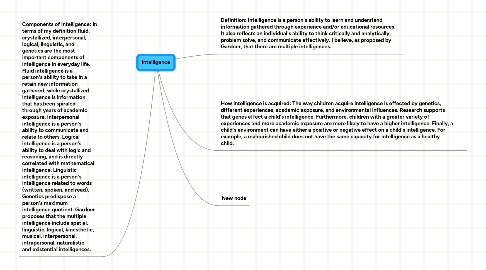Intelligence
作者:Debrah Jacobson

1. Components of Intelligence: In terms of my definition fluid, crystallized, interpersonal, logical, linguistic, and genetics are the most important components of intelligence in everyday life. Fluid intelligence is a person's ability to take in a retain new information gathered, while crystallized intelligence is information that has been spiraled through years of academic exposure. Interpersonal intelligence is a person's ability to communicate and relate to others. Logical intelligence is a person's ability to deal with logic and reasoning, and is directly correlated with mathematical intelligence. Linguistic intelligence is a person's intelligence related to words (written, spoken, and read). Genetics predispose a person's maximum intelligence quotient. Gardner proposes that the multiple intelligence include spatial, linguistic, logical, kinesthetic, musical, interpersonal, intrapersonal, naturalistic, and existential intelligences.
2. Definition: Intelligence is a person's ability to learn and understand information gathered through experience and/or educational resources. It also reflects an individual's ability to think critically and analytically, problem solve, and communicate effectively. I believe, as proposed by Gardner, that there are multiple intelligences.
3. How intelligence is acquired: The way children acquire intelligence is effected by genetics, different experiences, academic exposure, and environmental influences. Research supports that genes effect a child's intelligence. Furthermore, children with a greater variety of experiences and more academic exposure are more likely to have a higher intelligence. Finally, a child's environment can have either a positive or negative effect on a child's intelligence. For example, a malnurished child does not have the same capacity for intelligence as a healthy child.
4. New node


